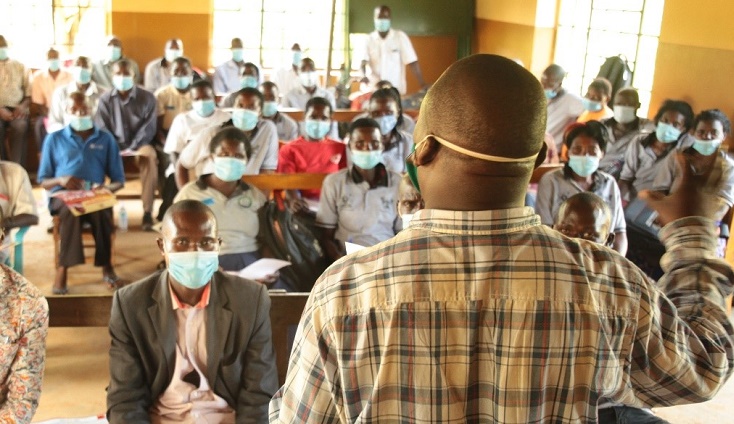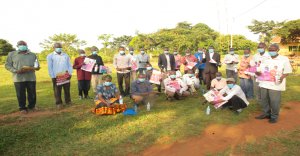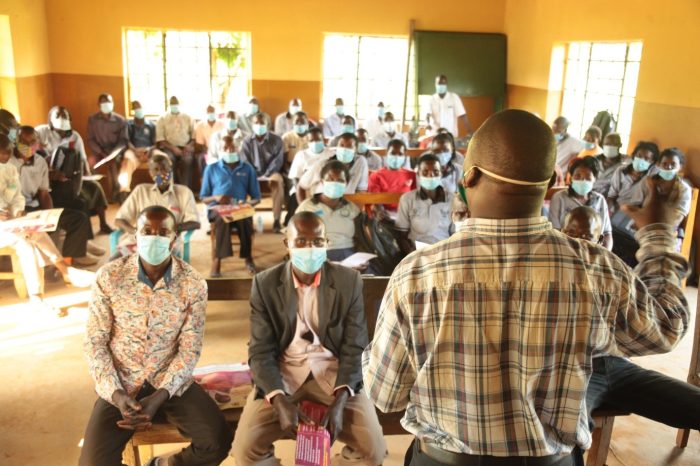

Community Health Workers and Local Council leaders play a very vital role in Uganda’s primary health care and it is ideal that they are engaged in combating the community transmissions of COVID 19. This category of leaders are bringing services to the people in communities and have a record of creating demand and coverage on services like immunization among others.
Now that world is faced with the deadly COVID 19, countries like Uganda with seemingly wanting healthcare readiness need to leverage on the voluntariness of the Community Health Workers and local leaders at the local council level. Harnessing this opportunity, the Centre of Excellence for Maternal Newborn and Child Health has conducted knowledge, skills and competence trainings on essential practices using the COVID 19 Standard Operating Procedures for the Community Health Workers and local leaders in the Busoga sub-region district of Luuka. These trainings aimed at empowering the Community Health Workers to deliver an integrated health package for preparedness and response to prevent the spread of COVID 19.
The training of the Community Health Workers and local council members in Bukooma, Ikumbya, Bulongo rural, Nawampiti, Irongo, Bukanga, Waibuga and kiyunga town council was done in four days while observing the Standard Operating Procedures (SOPs). The training focused on topics like; a) understanding COVID 19 signs and Symptoms, b)prevention and promotion, c)communication and negotiation skills, d) maternal and child health education card, e) importance of data and documentation, f) appropriate care seeking behavior and g) adherence to public health care advice for COVID 19 (transmission, building trust, reducing fear, strengthening collaboration and promotion uptake of public health measures and essential services), h) COVID 19 and safety protocols ,i) identification of people most at risk of severe COVID 19. The Community Health Workers continue to carryout out home visits for COVID 19 purposes while maintaining their routine activities of malaria prevention, RMNCAH activities, WASH, among others.
This training was delivered using a simple checklist focusing on specific indicators and routine activities was developed in line with COVID 19 and it was shared with the Community Health Workers and the local council leaders. To present this, approaches like pre and post training assessment, close and meaningful engagement of trainees (Participatory in nature), demonstrations, role plays, group discussions, plenary and lecture were applied. At the end of the training, 258 community health workers and 220 Local Council leaders were trained. The groups currently teaching communities on prevention and help with early identification and referral for COVID-19.
For many years, Community Health Workers and Local Council Leaders have been engaged in disease prevention and numerous successes have been registered when these categories are meaningfully involved. In countries like the United States, 64,900 community health workers are actively working in their communities to treat diseases like diabetes, HIV/AIDS, tuberculosis, or cancer, and provide prevention services ranging from sexual and reproductive health, behavioural health, cardiovascular health, and chronic disease. During the pandemic, they have also played an important role. Therefore, Uganda and other LMICs should follow through on this approach in order to curb the uncertainties that trail with COVID 19.

During these trainings we found that the CHWs and LCs are facing major communication challenges where people are not adhering to the COVID 19 SOPs due to the conflicting priorities that is to say people earning hand to mouth are faced with a challenge of choosing between buying mask or sanitizer over food. Therefore, during the training communication skills training was included to teach these CHWs and Local Leaders on how they can deliver a message for people to understand why the SOPs are currently more important for their lives. The trainees appreciated the training initiative and urge the government and partners to support them further to execute their duty and fight against COVID 19 collectively.
The key take a ways from this training were Community Health Workers are willing to work even with limited resources, the appreciate the elements of skills and knowledge development, and lastly trainings are one of the many ways Community Health Workers and Local leaders are empowered and once they are empowered, the community voices are elevated because of the charisma they command while delivering services in their communities.
